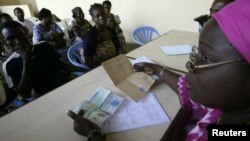More than 20,000 people in West Africa have gained identity documents in the past year as part of a drive to eradicate statelessness, yet about 1 million in the region still have no nationality, the United Nations said Thursday.
Stateless people, sometimes referred to as legal ghosts, are not accepted as citizens by any country, which means they are denied basic rights — leaving many unable to work or access health care — and are vulnerable to exploitation and traffickers.
Many West Africans are left stateless by laws that prevent women from passing their nationality to their children and a lack of birth registrations, the U.N. High Commissioner for Refugees said.
About 22,000 people in Ivory Coast, Benin and Mali have received identity documents or birth certificates since the 15-member Economic Community of West African States signed a declaration in January last year that it would end statelessness.
"Thousands of people who, until now, did not have a determined nationality will come out of the shadows," said Liz Ahua, UNHCR regional representative for West Africa. "Thanks to the reforms currently being implemented in several states in West Africa, these men, women and children will finally be able to obtain a legal identity."
Nations' responses
Several West African countries have adopted action plans to tackle the issue, the UNHCR said. Guinea, Burkina Faso, Liberia and Togo are reviewing their nationality laws, while Senegal is working on a law to protect children from being born stateless.
"Thousands of children in West Africa, such as street children, are not declared at birth. ... They can be easily exploited by human traffickers or forced to work," said Emmanuelle Mitte, UNHCR senior regional protection officer.
There are an estimated 10 million stateless people worldwide, with other big populations in Nepal, Myanmar and Thailand.
The UNHCR launched a global #ibelong campaign to end statelessness within a decade in November 2014.













